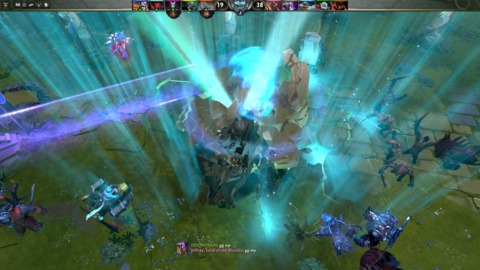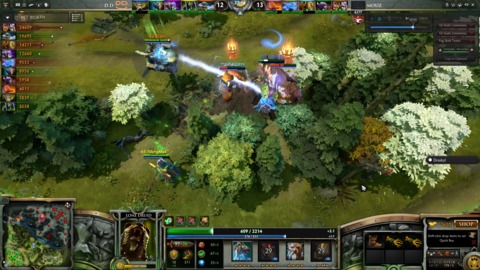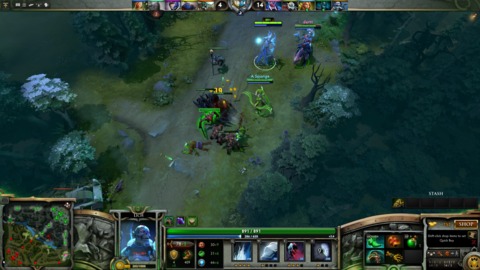Dota 2 is hard, but there's a huge reward for those who commit. On the surface, the game is a like-for-like reproduction of the genre-creating (and still updated) Defense of the Ancients modification for Warcraft III, now transferred into Valve's Source engine. The game's punishing design is sometimes enough to drive you up the wall, but it's worth sticking the hours in: success in Dota 2 is about learning to effectively juggle both the broad strokes and finer details.
If you're not aware of the basics of the burgeoning MOBA genre, two teams of five players spawn on corners of a map. Each team needs to work together with the goal of ultimately destroying a central structure--in Dota 2's case, the Ancient--in the opposing team's base. With most games lasting around the 40-minute mark, and occasionally edging past an hour, watching the enemy fortress dramatically crumble and sink to the ground feels like an exhilarating payoff.
Aiding these two teams, named the Radiant and the Dire, are waves of AI assistants, called creeps. Batches of creeps spawn at 30-second intervals and charge merrily up the map's three pathways. In the clumps of remaining land lies a jungle, where numerous AI opponents spawn, offering lucrative benefits to players who take them on successfully. Finally, and in a bid to stop both teams from simply marching into one another's base, each team gets three powerful towers on each lane that easily shred through enemy players at the start of the game.
Your individual ability to control and affect the rhythm of the game comes from how well you handle your hero. You mostly control a single unit in Dota 2, though there are exceptions: some heroes can summon controllable allies, such as bears, gargoyle babies, or wolves; one exceptionally versatile hero can split into three; and one item lets you take control of certain creeps. For each rule in Dota 2's impressive house-of-cards design, there's usually at least one character who completely ignores it, or finds a way around it via one of 130-odd items available from the in-match shop. For instance, try negating magic attacks with the black king bar, returning damage with the blade mail, or pounding out two ultimate abilities in quick succession with a refresher orb.

The aim for most players is to accumulate as much gold and experience as possible, with income being delivered mostly by scoring the killing blow on enemy creeps and players. It's almost always easier to gang up on stray enemies as a group, which is why it's rarely a good idea to run about on your own. Then it's a case of splashing all your hard-earned money on some ultra-powerful items from the shop, while levelling up your base stats and abilities, and then clobbering the enemy team into submission via a few five-versus-five team fights. Rarely does it feel that simple, however.
At the time of writing, 102 of the original Dota's 112 heroes have made their way into the sequel. Each hero has a handful of unique abilities and generally works best in a specific role, such as supporting other players as Omniknight, roaming around the map looking for opportunistic kills as Spirit Breaker, or evolving throughout the course of the game into an all-powerful vehicle of carnage and destruction as Phantom Assassin.
There's only one map, unlike in many other MOBA titles, although Valve has not ruled out the addition of more over time, and has previously offered game-changing modes with seasonal events at Halloween and Christmas. But Dota 2's single sprawling map sets itself apart from the competition by being larger, more intricate, and packed with greater detail than the rest of the genre. Unlike in League of Legends, the jungle area is riddled with far more tangling pathways, the lanes feature additional shops selling exclusive items, and savvy players are given more opportunities to use the environment to hide, flee, and ambush their opponents.
There are multiple layers of additional information that become increasingly relevant as you invest more time in the game. How do you effectively divide your forces? When should your team attempt to vanquish Roshan, the map's most powerful creep? What are runes? What's the significance of the fact that creeps get slightly stronger every seven and a half minutes?

Often the game's dizzying scale is seen as off-putting or simply too complex, but the truth of Dota is that it can be entertaining as a new player to just sit down and let all those extraneous factors play out around you. Getting down to the brass tacks of the game with a group of like-minded friends is a lot of fun: start by buying your characters' recommended items, try your best not to get caught out of position, and get into the habit of buying observer wards. And watch out for Riki.
As you'd expect from Valve, this is a beautifully presented game, with the Half-Life and Portal maker running victory laps around its competition in terms of UI, voice acting, and showing how to deftly add real personality to its characters. Only recently has the developer turned its attention to gently easing new players into the proceedings, however, and even now, mastering the basics feels like learning to swim by jumping in at the deep end. Efforts are being made to remedy this, though: right now there are a couple of tutorial levels, some well-designed AI bots, and a newbie playlist that restricts hero selection to just 20 of the most frequently picked characters. And with community-created hero guides now built directly into the game itself, Dota 2 is much easier to get started with than it has been in the past.
Play a match every evening for a couple of weeks, and you start to see how Dota 2's wealth of disparate systems and mechanics combine into their own harmony, and you begin to understand how there are hundreds of elements that affect the game. Dota 2 is a tense war of accumulation and attrition. The biggest problem, which is coincidentally where the real excitement of the game lies, comes from struggling to process and interpret dozens upon dozens of mitigating circumstances while simultaneously trying to keep your cool.
It is a complicated and exhausting game, and for the first few weeks, it's challenging just keeping up with the general rhythm of a match. But invest enough time into Dota 2, and you develop an almost unconscious ability to keep up with the game--performing actions such as sending the slightly fiddly in-game courier over to the faraway "secret" shop to get some rare items, for instance. After a couple of hundred hours of Dota 2, what once felt like spinning plates just happens automatically.
Late-night Skype calls, drawn-out conversations down at the pub, and lost lunch breaks follow. Very few games can withstand so many emotionally charged discussions. When everything goes south, the psychological toll can be surprisingly intense, and this is very much a game with the power to both start and end close friendships. Dota 2 is an overwhelming, intoxicating, and emotionally dangerous game that can quite easily take over your entire gaming life.
While Dota 2 has transferred the core of the original Dota into a cleaner, modern engine, the fact remains that losing is uniquely painful. Death in Dota 2 not only gives your opponent money, but robs you of some of your own and leaves you waiting up to a minute to respawn. By the time you've trudged back across the game's massive map--or spent money on a teleportation scroll--your opponent is now stronger and richer. Die two or three times in quick succession, which is easily done, and a match of Dota becomes a painful experience where you spend the next half hour getting bullied by an increasingly superior enemy. Other games in the genre have tried to mitigate this punishment, but Dota 2 positively revels in its complexities. The rich just get richer.

Occasionally there are big, beautiful reversals that turn into plucky underdog stories to be shared on forums and between friends, but for the most part, a team that starves its opposition of money and experience wins the game. Dota 2 ups the ante even further by featuring the concept of denying--one of its most divisive features, and one of the chief distinctions between Dota 2 and Riot's League of Legends--which is when you purposefully kill off your own creeps, allies, and structures so that the enemy team doesn't get the experience or gold.
A tense game is always going to be exhilarating, of course, though the game's matchmaking system often feels like a weak link. The gargantuan task of bucketing groups of players into balanced matches in a game that requires both individual and group skills is understandably challenging, but too many matches feel a bit lopsided--either an effortless stomp or a painfully inevitable defeat. Hopefully the influx of new blood over the coming months will help smooth out these bumps.
Valve has poured considerable effort into building Dota 2's powerful client, however, and this impressive platform can sometimes help take the sting out of defeat. This is a free-to-play game, but it's one which sets itself apart by being an unquestionably fair one: every hero is immediately available to all players, unlike in League of Legends, and real-money purchases of weapons, hats, and armour are purely cosmetic. Following Team Fortress 2's lead, the game also regularly drops tempting crates that can be unlocked with keys costing a couple of bucks. At the end of each game, players are subjected to a showering of random loot drops, and it's easily possible to notch up hundreds of items just by playing normally for six months.

Dota 2's extensive customisation offers new taunts, announcers (Half-Life 2's Dr Kleiner is a particular highlight), and HUD skins, with many of these items created and voted into the game by the community. Passes to watch pro matches live from the in-game client can also be purchased, and Dota 2's suite of options to spectate matches (with incorporated commentary) are undoubtedly the envy of every other MOBA developer on the planet. This is a free-to-play game that feels generous, with profits being dished out to item creators and the eSports teams, and Valve is already in the habit of running seasonal events that award you with heaps of new items.
The original Dota was an unexpectedly powerful blend of clashing genres and disparate elements that ended up taking over the world, and Valve's successor retains the original rules and characters while adding in a cheery free-to-play model and slick production values. The experience of playing Dota changes day by day--some evenings will be exhilarating, while others will kick your morale to the curb--but there are few games as worthy of your time investment as this. Those who choose to commit to Dota 2 will find many happy hours within this immaculate update.